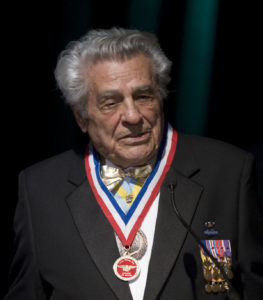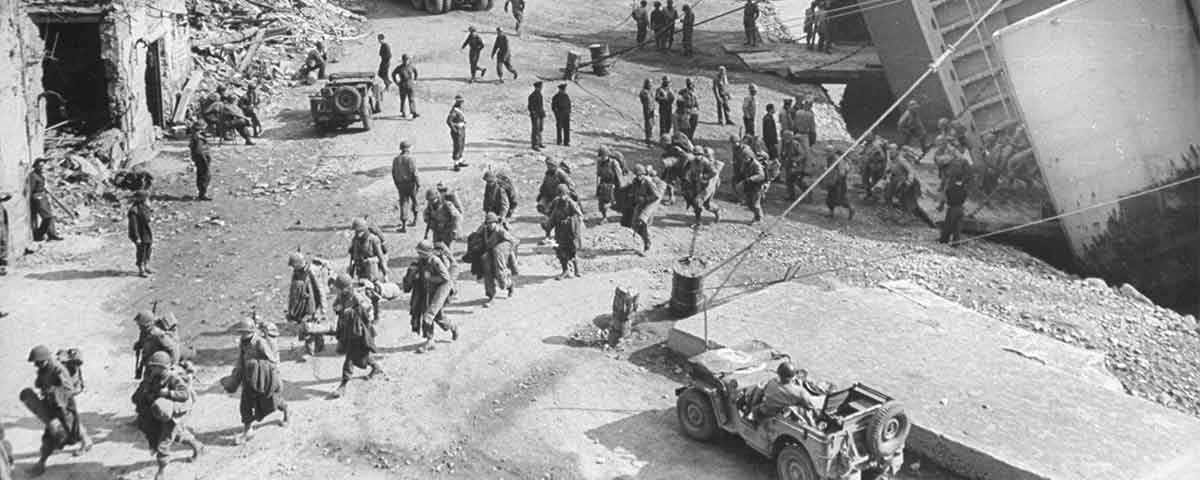
PEOPLE GLAMORIZE war,” 95-year-old Jim Megellas notes, “but it’s about brutality, rage, and survival.” The retired lieutenant colonel, the 82nd Airborne’s most decorated soldier, ought to know. “Maggie” led from the front through Anzio, the Apennine Mountains, Market Garden, the Bulge, and across the Rhine. His company was replaced 10 times; he earned a Purple Heart and has just been nominated for a Medal of Honor. In his straight-talking book, All the Way to Berlin (Presidio Press, 2003), he relates “what I saw through the sights of my gun.”
Why start writing a book at age 80?
I wanted to emphasize three things. First, war is the most brutal form of human endeavor, and those who glamorize it dishonor the memories of those who died fighting. War is not something you embellish. Second, most histories emphasize higher-level leadership, but I wanted to get down to the battlefield’s cutting edge, the people who actually led the fighting. Third, my story was unique. I joined a rifle company—H Company, 504th Parachute Infantry Regiment—as a platoon leader in the mountains of Italy, and when the war ended, I was still a platoon leader in H Company 504. They offered to promote me a few times because they thought I’d used up my lucky numbers. But people like me were like the Marines: volunteers who wanted to come to grips with the enemy. We were less than 10 percent of the army. But I wanted to kill Germans.
Why?
Because they were the enemy, and war is won and lost on the battlefield. World War II was fought by young men in or just out of their teens, led by NCOs and junior officers. That’s where 78 percent of the casualties in the 82nd Airborne were. I’m not saying people like me were better than rear-echelon troops or higher-level officers. Far from it. Everybody had a job to do. Our job was fighting and killing and dying. I learned my job from the Germans. I didn’t go by the book; I studied them.
Why did you lead from the front?
My men were mostly right out of high school; by the time we were in Italy, I was 27. I wasn’t going to send them out to lead patrols or check out minefields. That was my job, even though the manual said I was supposed to pick a squad leader for that. But I knew I’d get ’em killed. How you look after your men is the most important thing for a leader. Taking care of my men meant they would follow me, and I felt safer because I knew they’d fight for me. And I knew things they didn’t.
For example?
Bouncing Bettys. I learned about them the hard way. I was told to occupy an Apennine mountaintop called the Pimple that the Germans were using to direct fire on us. We started out single file. About halfway up, a loud bang went off. One of my guys had hit a tripwire and a Bouncing Betty jumped up and killed him. We learned to check every inch of our way—the Germans did a great job of concealing mines—and keep a safe distance apart, so if the Betty got someone, it got only him. When we got to the top, we found a Betty. I’d had a man killed; I wanted to learn what did it. I very carefully dismantled it behind a rock, counted the number of pellets, figured out the mechanisms. That helped me save lives.
You were wounded and eventually sent to Anzio.
We originally planned to jump into the Anzio beachhead, but the commanders changed their minds. So in January 1944, we rode in with the assault force for Operation Shingle. They let the landing craft doors down, and we charged in—almost unopposed except for some German fighters, which came in low and strafed us on the beachhead. We were almost 30 miles north of Anzio; we could’ve gone on to Rome, because the Germans weren’t entrenched there. But the corps commander wanted to expand the beachhead.
How did the Germans respond?
They sent forces to contain us. Several miles ahead of our position was a mountaintop where they brought in Big Bertha, a 16-inch gun on railroad tracks; it poured fire on us. We were in 3rd Battalion sector, to the right of the British 1st Division. The Germans broke through the British lines, through brigade headquarters, heading unimpeded for division HQ. Lieutenant Richard “Rivers” LaRiviere and I and 25 men—what was left of a company that had had 110 men and seven officers when we went in—were ordered to fill the breach. We moved forward and to the left at night, using what cover we had. We made contact with no retreating force, no friendly force. Finally we began to hear gunfire. We halted the patrol and put the troops behind a roadbed and told them to dig in. We had to know what the Germans were up to, so Rivers and I—the only two officers— went to take a look. Not what the manual said to do.
What did you find?
The Germans were flush with victory, making noise, calling out to each other. We figured now we know where they are; we better get back to the roadbed. Then I took my whole platoon—six men! I led. My platoon sergeant, Thomas Radika, brought up the rear. A German machine gun opened fire and killed him. We crawled back down the hill to take cover. When darkness fell, Rivers and I crawled back up and got Radika’s body. Paratroopers, like Marines, don’t leave their dead and wounded behind.
What did Anzio teach you about yourself and your men?
We came under tremendous pressure. The Germans outnumbered us 10 or 15 to one and had us surrounded—or, as I like to say, we had them surrounded from the inside. They dropped propaganda leaflets on us while we huddled behind a dike to count ammo and grenades. We dug in; we knew the Germans were coming down that hill. And we said,“OK, you know where we are, come and get us; we’ll take plenty of you with us.” There was never a thought of surrendering. Our job was to kill Germans. You don’t kill by surrendering. I don’t fault anyone for surrendering. But if we had to fight them with knives, that’s how it would be. Rage kept us going, kept us killing, battle after battle. We had a firefight that night. They threw grenades at us; we threw ’em back. I got wounded; my left arm was immobilized after a few days. But the morning after, dead German bodies littered that slope, and I re-zeroed my M1’s sights by shooting at their helmets. That may sound gruesome, but that’s war.
Your wound got you evacuated to Naples.
I got a Purple Heart with oak cluster and a Bronze Star; the unit got a Presidential Citation. When he decorated us, General Mark Clark said the 3rd Battalion saved the beachhead.
After Market Garden failed, you were in the Battle of the Bulge.
The high command called us in from France. We got on trucks and moved to Belgium trying to locate the enemy—with no intel. But it was up to us—GIs led by NCOs and junior officers—to stop the Germans. Christmas 1944, we were digging in on high ground at Bra, Belgium. The Germans had holed up in a woods, where they were concealed. We knew what was coming. When they were ready to attack, they sent a patrol to feel out our position. I let them get in close and take cover behind a downed B-17. We opened fire on them and broke that patrol up. But the Germans were probing our lines all the way up and down. Before they came at us, there was an artillery barrage. When the SS troopers came charging out of that woods, they had overhead fire. They used everything they had in a coordinated way. I first learned that at Anzio. Thank God I did, because I knew what to expect. It helped us hold the line.
You dislike the term “Greatest Generation.” Why?
It’s insulting to everyone, including the men who fought and died in World War II. My generation was not the Greatest Generation. The Greatest Generation has not yet been born. That will be the generation that learns how to solve problems without war. Maybe that’s idealistic. But it’s what I believe.
Originally published in the October 2013 issue of World War II. To subscribe, click here.





